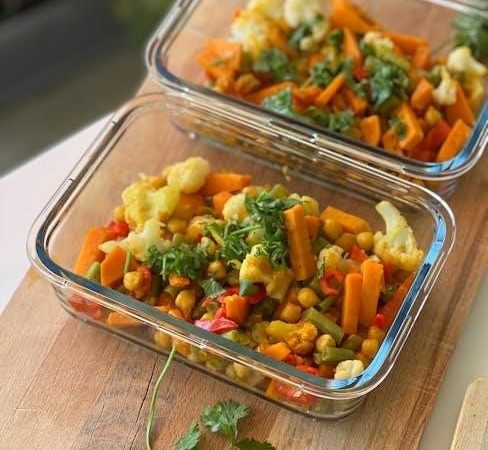A 30-day plant-based diet plan offers a structured approach to transforming your eating habits, focusing on whole, unprocessed foods․ It promotes improved health, weight management, and environmental benefits, making it a sustainable choice for a healthier lifestyle․
Overview of the 30-Day Plant-Based Diet
A 30-day plant-based diet plan focuses on whole, unprocessed foods like fruits, vegetables, legumes, and whole grains․ It offers a structured approach to transitioning to plant-based eating, with weekly meal breakdowns and daily recipes․ Designed for both beginners and experienced individuals, it emphasizes balanced nutrition, variety, and sustainability․ The plan aims to simplify meal preparation, reduce food waste, and provide a clear path to adopting a healthier, environmentally friendly lifestyle;
Why Choose a Plant-Based Diet?
A plant-based diet offers numerous health benefits, including weight loss and improved overall well-being․ It reduces the risk of chronic diseases, such as heart disease and diabetes, by focusing on nutrient-rich foods․ Additionally, it supports environmental sustainability by lowering carbon footprints and promoting eco-friendly food production․ This lifestyle choice is ideal for those seeking a balanced, ethical, and sustainable approach to nutrition, backed by scientific research and expert recommendations․

Benefits of a Plant-Based Diet
A plant-based diet enhances health, supports weight loss, and reduces environmental impact․ It promotes longevity, improves energy levels, and fosters a sustainable lifestyle․
Health Benefits
A plant-based diet offers numerous health benefits, including reduced chronic disease risk, improved heart health, and enhanced digestion․ It often leads to weight loss and increased energy levels, while providing essential nutrients like vitamins, minerals, and antioxidants․ A well-planned plant-based diet can also lower blood pressure and cholesterol, improving overall well-being and longevity․ It supports a stronger immune system and reduces inflammation, promoting a healthier lifestyle․
Environmental Benefits
Adopting a plant-based diet significantly reduces your carbon footprint by lowering greenhouse gas emissions and supporting sustainable agriculture․ It helps conserve water and reduces land use, as plant-based foods require fewer resources to produce compared to animal products․ By choosing whole, minimally processed foods, you contribute to reducing food waste and promoting eco-friendly farming practices, making it a powerful choice for environmental sustainability․
Weight Loss and Improved Well-being
A plant-based diet often leads to weight loss due to lower calorie and fat content in plant-based meals․ It promotes improved well-being by providing essential nutrients, vitamins, and minerals․ By focusing on whole, unprocessed foods, individuals can experience enhanced energy levels, better digestion, and overall health, making it an effective way to achieve sustainable weight loss and improve quality of life․
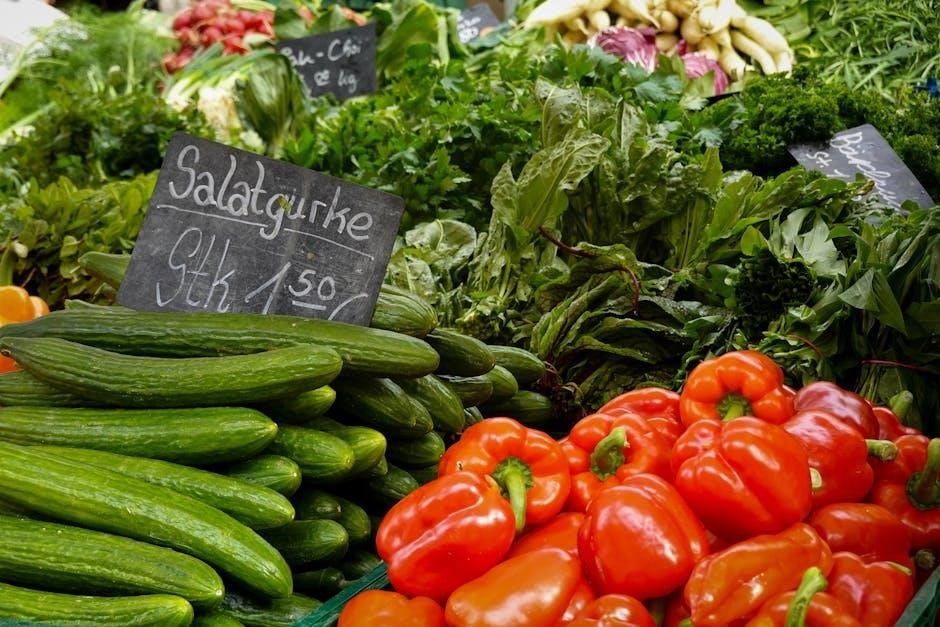
30-Day Plant-Based Meal Plan Structure
A well-structured 30-day plant-based meal plan ensures balanced, nutrient-dense meals․ It includes a weekly breakdown of breakfasts, lunches, dinners, and snacks, promoting variety and sustainability․
Weekly Breakdown of Meals
A 30-day plant-based meal plan is divided into weekly segments, ensuring variety and balance․ Each week focuses on different whole foods like legumes, grains, fruits, and vegetables․ Breakfast, lunch, and dinner options are planned to provide essential nutrients․ Snacks and smoothies are included for energy boosts․ The structure minimizes food waste and offers flexibility, making the transition to plant-based eating enjoyable and sustainable․
Breakfast, Lunch, and Dinner Ideas
Breakfast options include overnight oats, smoothie bowls, and tofu scrambles․ Lunches feature hearty salads, wraps, and soups, while dinners offer hearty dishes like lentil curries, quinoa bowls, and stuffed vegetables․ Each meal is designed to be nutrient-rich, flavorful, and easy to prepare, ensuring a delicious and balanced plant-based diet throughout the day․
Snacks and Smoothies
Snacks like fresh fruits, trail mixes, and veggie sticks with hummus keep you satisfied between meals; Smoothies blend vibrant berries, leafy greens, and plant-based proteins, offering quick nutrition on-the-go․ These options are perfect for maintaining energy levels without compromising on taste or health benefits, ensuring a seamless transition to a plant-based lifestyle․
Challenges and Solutions
Transitioning to a plant-based diet can present challenges like cravings or social pressures․ Solutions include meal prepping, seeking support groups, and exploring new recipes to stay motivated and satisfied throughout your journey․
Common Challenges When Starting a Plant-Based Diet
Starting a plant-based diet can be daunting, with challenges like meal planning, cravings, and social pressures․ Many struggle with protein sources, nutrient deficiencies, and adjusting to new flavors․ Cravings for familiar foods and the inconvenience of finding plant-based options can also hinder progress․ Additionally, social situations, like dining out or family meals, may require careful navigation to stay on track with your dietary goals․
Practical Tips for Staying on Track
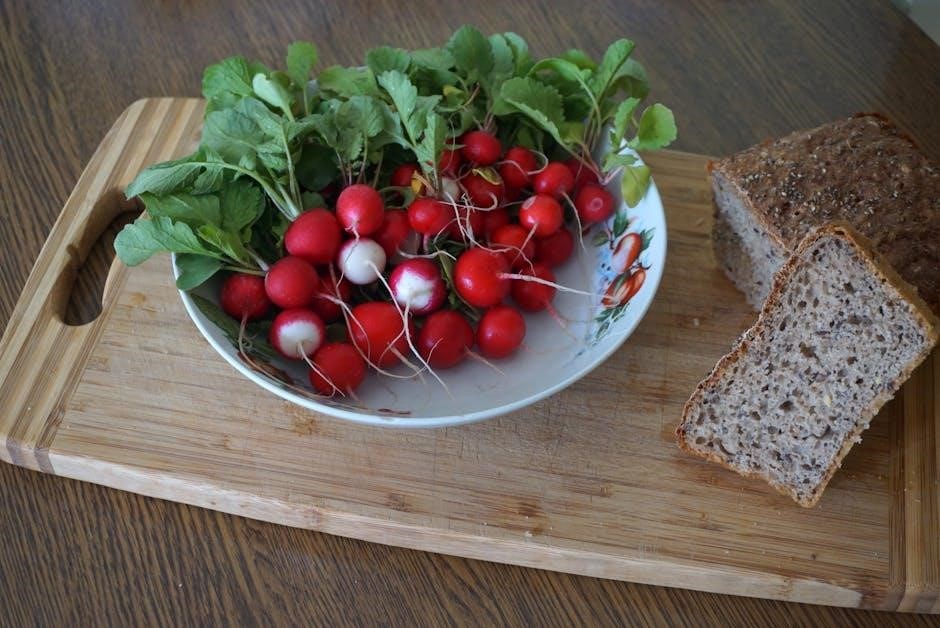
Plan meals in advance and prep ingredients to save time․ Incorporate plant-based alternatives for familiar foods to ease the transition․ Use meal planning apps for inspiration and grocery lists․ Build a support system, like joining online communities or cooking with friends․ Celebrate small victories to stay motivated, and don’t be too hard on yourself if you slip up—simply refocus and continue your journey․
Health Impacts of a Plant-Based Diet
A plant-based diet can improve gut health, reduce chronic disease risks, and boost energy levels by focusing on nutrient-rich, whole foods that support overall well-being․
Nutritional Benefits and Deficiencies to Watch For
A well-planned plant-based diet offers abundant vitamins, minerals, and antioxidants, reducing chronic disease risks․ It is rich in fiber, vitamins C and E, and potassium․ However, deficiencies in vitamin B12, iron, and omega-3 fatty acids may occur․ Ensuring adequate intake of fortified foods or supplements is crucial․ Consulting a healthcare professional can help address these concerns and optimize nutritional benefits for long-term health and well-being․
Mental Health and Energy Levels
A plant-based diet can enhance mental clarity and reduce stress, promoting better mood stability․ The abundance of antioxidants and omega-3 fatty acids supports brain health, potentially reducing anxiety and depression symptoms․ Many report increased energy levels due to improved digestion and nutrient absorption․ A balanced intake of complex carbs, proteins, and healthy fats helps maintain stable energy throughout the day, contributing to overall mental well-being and vitality․
Environmental Impact of a Plant-Based Diet
A plant-based diet significantly reduces greenhouse gas emissions, water usage, and land degradation․ It promotes sustainable agriculture, helping to protect ecosystems and reduce the carbon footprint associated with food production․
How Plant-Based Diets Reduce Carbon Footprint
Plant-based diets significantly lower greenhouse gas emissions by reducing livestock farming, which is a major contributor to carbon emissions․ They decrease water usage, as plant cultivation requires less water than animal agriculture․ Additionally, plant-based diets reduce land use, preserving forests and ecosystems․ By choosing sustainable, locally sourced foods, individuals can further minimize their environmental impact, promoting a more eco-friendly food system and healthier planet․
Sustainable Eating Practices
Sustainable eating involves reducing food waste by repurposing leftovers and planning meals․ Opting for seasonal, locally sourced foods minimizes transportation emissions․ Choosing whole, unprocessed foods reduces packaging waste․ Incorporating plant-based recipes ensures resource efficiency․ These practices align with a 30-day plant-based diet, promoting environmental stewardship and supporting local economies; By adopting these habits, individuals contribute to a healthier planet while maintaining a balanced and nutritious lifestyle․

Getting Started with a 30-Day Plant-Based Plan
Starting your 30-day plant-based journey begins with setting realistic goals and expectations․ Stock your pantry with whole grains, legumes, and fresh produce to ensure success․
Setting Realistic Goals and Expectations
Starting a 30-day plant-based diet requires clear, achievable goals․ Focus on gradual changes, like increasing plant intake daily․ Aim to replace one meal with a plant-based option initially, then progress to full meals; Listen to your body and celebrate small victories․ Be patient with cravings and setbacks, as adapting to new habits takes time․ Stay committed to your health journey for lasting results․

Stocking Your Pantry for Success
A well-stocked pantry is key to a successful plant-based diet․ Include staples like whole grains, beans, lentils, nuts, seeds, and spices․ Fresh fruits and vegetables should be replenished weekly․ Healthy fats such as avocados, olive oil, and coconut oil are essential․ Ensure you have plant-based milks and protein sources like tofu or tempeh․ This setup will make meal preparation convenient and enjoyable throughout your 30-day journey․
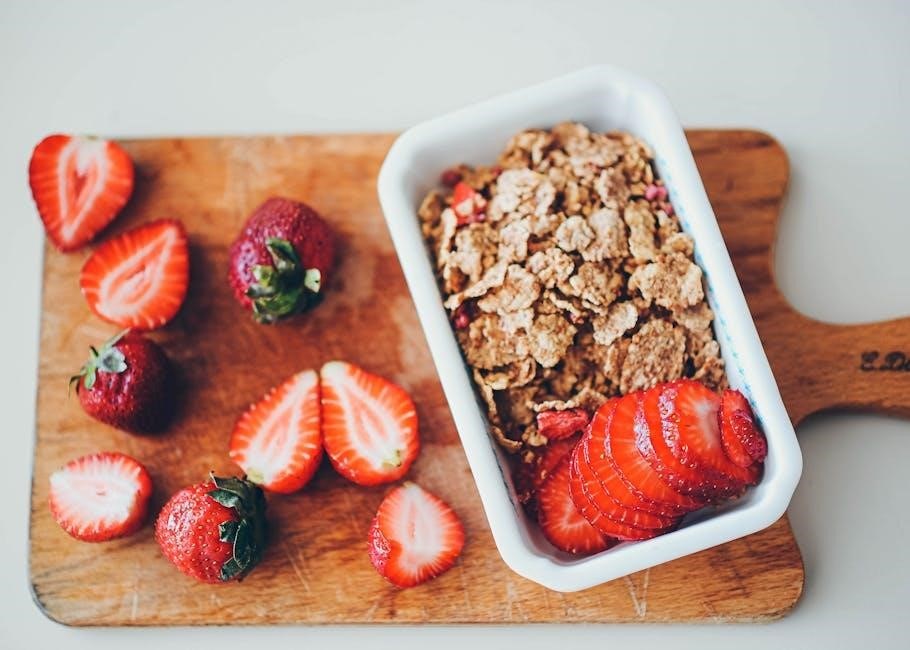
Delicious and Easy Plant-Based Recipes
This section offers simple, flavorful plant-based recipes for breakfast, lunch, dinner, and snacks, ensuring variety and nutrition throughout your 30-day journey․ Explore hearty meals and treats․
Breakfast Recipes
Start your day with nutrient-rich plant-based breakfasts․ Try chia pudding with fresh berries, avocado toast on whole-grain bread, or a vibrant smoothie bowl․ Oatmeal topped with nuts and fruits is another hearty option․ Experiment with tofu scrambles or quinoa breakfast bowls for protein-packed mornings․ These recipes are easy to prepare, delicious, and keep you energized throughout the morning․ Incorporate variety to ensure a balanced and satisfying start to your day․
Lunch and Dinner Recipes
Enjoy a variety of hearty plant-based lunches and dinners, such as lentil soups, quinoa bowls, or grilled vegetable stir-fries․ Try stuffed bell peppers with brown rice and beans or a vibrant salad with chickpeas and avocado․ For dinner, opt for tofu stir-fries, roasted vegetable curries, or whole-grain pastas with marinara and sautéed spinach․ These recipes are nutrient-dense, flavorful, and designed to keep you satisfied and energized throughout the day․
Snack and Dessert Ideas
Keep your energy levels steady with plant-based snacks like fresh fruits, trail mix with nuts and seeds, or veggie sticks with hummus․ For desserts, try chia pudding with berries, dark chocolate-dipped fruit, or banana “nice” cream․ These options are nutrient-dense, satisfying, and align with your plant-based goals, ensuring a delicious and guilt-free treat any time of the day․

Weight Loss and Maintenance
A plant-based diet naturally supports weight loss through lower calorie and higher fiber intake, promoting satiety and balanced nutrition, while maintaining overall health and energy levels․
How a Plant-Based Diet Aids in Weight Loss
A plant-based diet promotes weight loss by focusing on high-fiber, low-calorie whole foods like fruits, vegetables, legumes, and whole grains․ These foods enhance satiety, reducing overall calorie intake․ Plant-based meals are often naturally lower in saturated fats and higher in nutrients, which can improve metabolism and support a healthy weight․ This approach also encourages mindful eating and reduces cravings for processed foods, aiding in sustainable weight management․
Maintaining Weight Loss Beyond 30 Days
After completing the 30-day plan, sustaining weight loss involves adopting long-term habits․ Focus on balanced, nutrient-dense meals, portion control, and regular physical activity․ Incorporate a variety of whole foods to keep your diet engaging and ensure you’re meeting nutritional needs․ Meal prepping and tracking your intake can also help maintain discipline․ Staying hydrated and getting enough sleep further supports weight management, ensuring the results of your 30-day plan are lasting and beneficial․
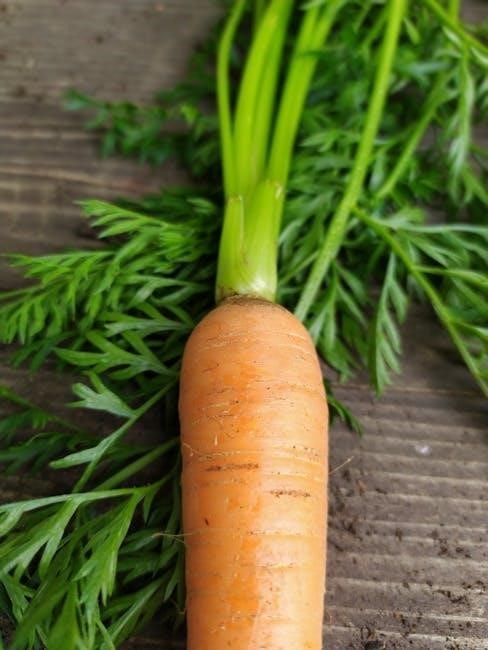
Long-Term Commitment to a Plant-Based Lifestyle
Embracing a plant-based lifestyle beyond 30 days fosters sustainable health, environmental harmony, and a stronger connection to a supportive community for lasting well-being․
Transitioning Beyond the 30-Day Plan
After completing the 30-day plan, transitioning to a long-term plant-based lifestyle becomes easier․ Focus on setting new goals, repurposing ingredients, and exploring diverse recipes․ This empowering journey supports gut health, reduces inflammation, and promotes environmental sustainability․ Embrace the benefits of a plant-based lifestyle and continue nurturing your body and the planet with whole, nutritious foods․
Building a Sustainable Plant-Based Routine
Creating a sustainable plant-based routine involves consistent meal planning and mindful shopping․ Incorporate seasonal produce, diverse recipes, and practical tips like meal prepping․ This approach fosters long-term adherence, reduces food waste, and supports overall well-being․ By focusing on nutrient-dense, whole foods, you can maintain a balanced and satisfying plant-based lifestyle that benefits both health and the environment․
Completing the 30-day plant-based diet plan is a commendable achievement․ It paves the way for a healthier, more sustainable lifestyle, benefiting both you and the planet․
Final Thoughts on Completing the 30-Day Plan
Completing the 30-day plant-based plan is a significant milestone, fostering healthier habits and a deeper connection to whole, nutrient-rich foods․ Many participants report increased energy, improved digestion, and noticeable weight loss․ The sense of accomplishment is rewarding, as it sets the foundation for long-term well-being․ Embrace the positive changes and consider continuing your plant-based journey for sustained health benefits and environmental impact․
Encouragement for Continuing a Plant-Based Journey
Embrace the empowering results of your 30-day journey and consider continuing your plant-based path․ The benefits of improved health, weight management, and environmental impact are compelling reasons to sustain this lifestyle․ With countless flavorful and nutritious options, adapting plant-based eating is both enjoyable and sustainable․ Stay inspired by exploring new recipes, connecting with supportive communities, and celebrating the positive changes in your well-being and the planet․
